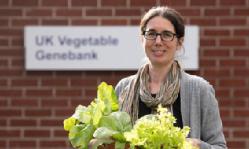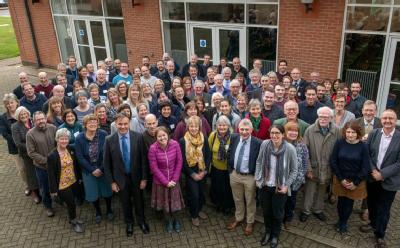Life Sciences News
See our Latest Journal Publications
Warwick plant scientist honoured with Royal Horticultural Society Veitch Memorial Medal
Dr. Charlotte Allender, Head of the UK Vegetable Genebank at the School of Life Sciences, The University of Warwick has been awarded the Veitch Memorial Medal by the Royal Horticultural Society (RHS) for her work conserving vegetable crop genetic diversity.
On her nomination, Charlotte said: "I am very grateful to the RHS for this award; to have such a prestigious organisation recognise the value of your work is wonderful.”
This award recognises Dr. Allender’s research into conserving genetic variation of crop species and for her almost two decades-long service to the UK Vegetable Genebank. This work has been vital for food security by preserving these sources of genetic variation that are needed to develop new and robust crop varieties.
Charlotte added: “The conservation of plant genetic resources is vital and underpins the research and breeding activity necessary to develop the new crop varieties needed for a food secure future. I would like to acknowledge that the work of the UK Vegetable Genebank is only possible with a team of skilled and dedicated staff and the support of the University of Warwick and Defra.”
The UK Vegetable Genebank celebrates its 45th anniversary later this year. It currently stores around 14,000 vegetable seed samples, sourced from 128 different countries, making it a globally significant resource.
Elizabeth Creak Distinguished Guest Lecture 2024
Join the School of Life Sciences and our distinguished guest speaker Professor Tim Benton to explore the global challenge of navigating food security in an increasingly volatile world.
Thursday 24 October 2024, IBRB, Gibbet Hill.
Celebrating 75 years of the Crop Centre’s pioneering agriculture research
The University of Warwick is celebrating 75 years of plant science research at its internationally recognised Crop Centre – the UK’s leading research facility for vegetable growers.
The Crop Centre, based at The University of Warwick’s Innovation Campus, Stratford-upon-Avon, was founded 75 years ago as the National Vegetable Research Station (NVRS) to address post-war pressure for food production. Research has continued on the site ever since, now incorporated into the University’s School of Life Sciences (SLS).
Press Release (23 July 2024)
Scientists explain how they are helping boost UK fruit and veg production in wake of new government report
Researchers at the University’s internationally recognised Warwick Crop Centre are reflecting on a new government report, ‘A blueprint to grow the UK fruit and vegetable sector’, which details plans to support the fresh fruit and vegetable sector.
Press Release (23 May 2024)
The University of Warwick celebrates the successful harvest of "GODIVA" and ‘OLIVIA’ – two novel dry beans inspired by local cultural history.
Researchers at Warwick Crop Centre have celebrated the successful harvest of a homegrown bean developed to thrive in a British summer.
Press Release (9 September 2023)
Professor Eric Holub and research fellow Rosanne Maguire discuss the novel bean varieties on BBC CWR.
CTP programme for Sustainable Agricultural Innovation - funded PhD project opportunity
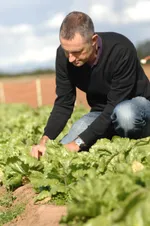 The UKRI and Biotechnology and Biological Sciences Research Council (BBSRC) has awarded a Collaborative Training Partnership (CTP) grant to a consortium led by G’s Growers Ltd. The CTP programme for Sustainable Agricultural Innovation (CTP-SAI) is a groundbreaking partnership between leading businesses, charities and research providers to offer outstanding training for the agri-food sector.
The UKRI and Biotechnology and Biological Sciences Research Council (BBSRC) has awarded a Collaborative Training Partnership (CTP) grant to a consortium led by G’s Growers Ltd. The CTP programme for Sustainable Agricultural Innovation (CTP-SAI) is a groundbreaking partnership between leading businesses, charities and research providers to offer outstanding training for the agri-food sector.
Through this programme, the University of Warwick is offering a PhD enabling the successful candidate to gain a wide range of experience in conventional and molecular plant pathology and also of microbial community analyses through next generation sequencing approaches. This PhD is a unique opportunity to blend research techniques from lab to field and work with one of Europe’s biggest lettuce producers. The project on 'Integrated control of Fusarium wilt of lettuce in relation to pathogen and microbial community dynamics' will be supervised by Professor John Clarkson (SLS) and Dr Helen Bates (NIAB).
The deadline for applications is 8 April 2022.
BBC Gardeners' World Magazine features Crop Centre PhD student Andy Gladman
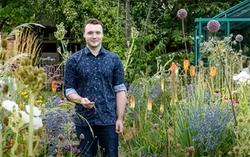 As part of a monthly series featuring the eight finalists in the 2020 BBC Gardeners World Magazine Gardens of the Year competition, Andy Gladman, a Crop Centre PhD student and his Leamington Spa ornamental allotment are the subject of March's edition.
As part of a monthly series featuring the eight finalists in the 2020 BBC Gardeners World Magazine Gardens of the Year competition, Andy Gladman, a Crop Centre PhD student and his Leamington Spa ornamental allotment are the subject of March's edition.
The six page article plots his journey,' driven from a lifelong passion for plants', especially kniphofia, echinops, verbena and buddleas and the set back of living in a top floor north facing flat, in transforming an overgrown allotment plot in 2018 from 'a field of couch grass and bindweed' to an 'astonishingly vibrant and drought tolerant garden'. With his interest in plant diversity there are 'around 100 cultivars of kniphofia (red hot poker') that he has been trying to accumulate and is planning on applying for a National Collection status for these and his echinops (globe thistle).
Working on a tight budget and with using materials that otherwise would go to waste as a very important aspect to him,' seed sowing and recycling have been key'. 'The entire path is made up of pavers from a fellow allotmenteer's old driveway' and both greenhouses, furniture in the summer house and one of the greenhouses and water trough are either secondhand or from charity shops.
Many of the plants are a haven for insects and the bees are everywhere. He noted a lot of butterfly diversity when taking part in the Big Butterfly Count 2020 and believes the allotment holders are pleased with the amount of pollinators his garden attracts to the allotments.
More information - Gardeners' World Magazine, March 2021, pages 72-77.
Andy Gladman is a PhD student with Dr Dave Chandler.
University of Warwick signs agreement with agronomy specialist to bring UK beans to market
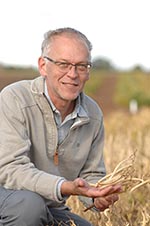 The University of Warwick’s research commercialisation wing, Warwick Innovations, has signed a contract with agronomy specialist Agrii to promote the commercial production of UK haricot beans developed by Professor Eric Holub from Warwick’s Crop Centre, part of the School of Life Sciences. Professor Holub has bred three haricot bean varieties which are adapted for growing in the UK climate and are more suited to standard farm machinery.
The University of Warwick’s research commercialisation wing, Warwick Innovations, has signed a contract with agronomy specialist Agrii to promote the commercial production of UK haricot beans developed by Professor Eric Holub from Warwick’s Crop Centre, part of the School of Life Sciences. Professor Holub has bred three haricot bean varieties which are adapted for growing in the UK climate and are more suited to standard farm machinery.
“Self-sufficiency in food production is important for reducing human impact on global climate. British-grown beans can help us shift our diets to a healthier future, adding to other UK ingredients to supply the growing trend of flexitarian diets with new markets like Brit-Mediterranean and Brex-Mexican style food.” Professor Holub.
Press Release (9 February 2021)
UK Vegetable Genebank 40th Anniversary event 5-9 October
On 8 October 1980, the UK Vegetable Genebank was officially opened on what is now the Wellesbourne Campus of the University. Since then, a collection of ~14,000 seed samples has been amassed, becoming a hugely important resource for plant breeding and research. We send seed out on request to plant scientists, breeders and even farmers both in the UK and around the world. Changes in the environment, and increase in the number of people on the planet and a need to reduce irrigation, pesticide and fertilizer inputs in farming mean that plant breeders and researchers need develop new varieties constantly so that vegetables can continue to provide vital nutrition in our diets.
Forty Years of Seeds for the Future
To celebrate our anniversary, we are holding an online event from 5-9 October.Link opens in a new window Take a virtual tour of the genebank and register for our public webinar to hear about genebank collections from a plant breeding, research and international perspective. We’ll also be featuring research by groups within SLS, showing the diverse ways in which our seed is being used and how innovation and technology is opening up new approaches. See you there!
Lockdown staff and students at University of Warwick to help with wildlife surveys
Members of the Warwick community who are living on campus during lockdown have the opportunity to help survey wildlife for a biodiversity project.
The Joy of Seeds
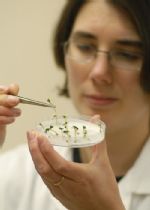 'Seeds are little bundles of future potential'. Find out about the wonders of seeds from Dr Charlotte Allender.
'Seeds are little bundles of future potential'. Find out about the wonders of seeds from Dr Charlotte Allender.
Read the Knowledge Centre article.
Arctic's Global Seed Vault to receive 1000 types of seeds from Warwick's Vegetable Genebank
Just under 1000 seed samples from different crop species including kale, carrots and cauliflower are to be deposited at the Svalbard Global Seed Vault in Arctic Norway on Tuesday 25 February 2020, from the UK Vegetable Genebank (UKVGB) at the University of Warwick Wellesbourne campus.
The Vegetables of Christmas Future
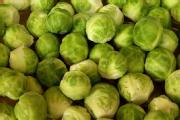 If you think about a traditional Christmas dinner, there’s turkey with pigs in blankets, or maybe you prefer a nut roast. But the rest is vegetables. A large proportion of our plate should be covered in vegetables, and the standard winter varieties, like carrots and sprouts, are grown very successfully in the UK.
If you think about a traditional Christmas dinner, there’s turkey with pigs in blankets, or maybe you prefer a nut roast. But the rest is vegetables. A large proportion of our plate should be covered in vegetables, and the standard winter varieties, like carrots and sprouts, are grown very successfully in the UK.
But will this always be the case? Climate change is bringing with it new challenges as well as making known pests and diseases more difficult to tackle. Scientists at Warwick's Crop Centre, are working to understand the pests and diseases of the some of the UK’s major crops and developing, using traditional plant breeding and genetic expertise, new resistant varieties.
Seed collection conserves genetic diversity of vegetables
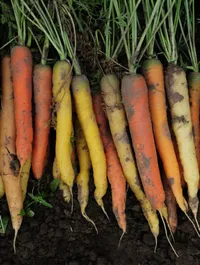 Listen to Dr Charlotte Allender discuss the need to conserve the genetic diversity of vegetables, and how this is being done at the University of Warwick's seed bank facility.
Listen to Dr Charlotte Allender discuss the need to conserve the genetic diversity of vegetables, and how this is being done at the University of Warwick's seed bank facility.
Radio discussion (28 Sept 2019)
The Warwick Genetic Resources Unit houses the UK Vegetable Genebank, a globally significant collection of around 14,000 seed samples of a range of vegetable crops.
New awards target breakthrough technologies to enhance food security
A recent collaboration between the BBSRC, the National Science Foundation (NSF) and the US Department of Agriculture's National Institute of Food and Agriculture (NIFA) is helping researchers potentially advance technology that brings more security to crop agriculture of the future. Dr Stephen Jackson and Dr Jose Gutierrez-Marcos are amongst those receiving funding.
Phenom UK 2019
On Monday 22 July, researchers from the University of Sheffield, Rothamsted Research and the University of Nottingham attended a networking event at the University of Warwick Wellesbourne campus. The event was organised by Dr Beatriz Lagunas and sponsored by Phenom UK (‘Technology Touching Life programme funded jointly by BBSRC/EPSRC/MRC). In the morning, visitors enjoyed a guided tour around the field research facility including the pathogen quarantine fields, insect pest trial area, the low nutrient field, and the main rotation fields for irrigated trials. In the afternoon, a round table discussion focused on the challenges of field-based phenotyping.
The breadth of expertise amongst participants allowed discussion of ideas for relating aerial spectral imaging of the crop canopy with below-ground differences in soil nutrient/root/microbe interactions. The consensus was that pilot data is needed in a specific crop from small-scale controlled experiments to identify disease signature wavelengths and then move to field phenotyping based, for example using drone-based imaging in collaboration with both the University of Sheffield and Rothamsted Research. The PhenomUK website will provide a useful forum for further discussions. All Warwick people interested in following up the discussions are encouraged to do it through the Plant & Crop Science Theme and to register at the Phenom UK websiteLink opens in a new window.
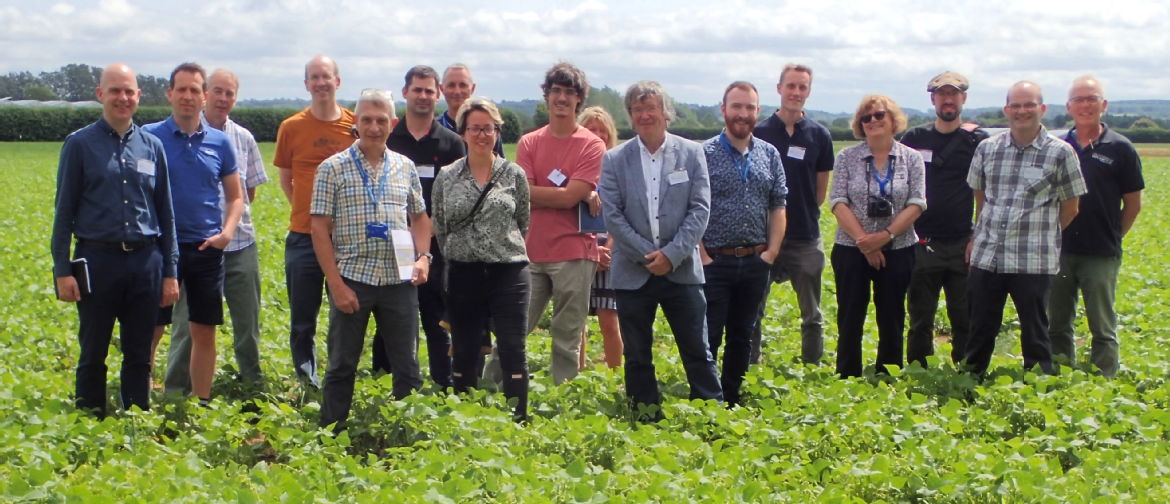
Phenom UK networking visit attendants standing in a field of haricot beans (from left to right):
Craig Sturrock (U. of Nottingham), Patrick Schäfer (U. of Warwick), Rob Lillywhite (U. of Warwick), Stephen A. Rolfe (U. of Sheffield), Graham Teakle (U. of Warwick), Gabriel Castrillo (U. of Nottingham), John Clarkson (U. of Warwick), Beatriz Lagunas (U. of Warwick), Guilhem Reyt (U. of Nottingham), Sally Mann (U. of Warwick), Malcolm Hawkesford (Rothamsted Research), Alexander McCormack (U. of Warwick), Tim Mauchline (Rothamsted Research), Rosemary Collier (U. of Warwick), Joost H.M. Stassen (U. of Sheffield), Rory Hayden (U. of Nottingham) and Eric Holub (U. of Warwick).
Construction begins on new hi-tech greenhouse at the Wellesbourne Campus
Work is underway on an innovative new greenhouse research facility at the University of Warwick’s Wellesbourne Campus. The project is a partnership between Crop Health and Protection (CHAP), one of the four UK Agritech Centres funded by Innovate UK, the innovator and developer, RIPE Building Services, and the University of Warwick, which will coordinate research through its School of Life Sciences.
It is the first major construction at Wellesbourne Campus since Warwick acquired the site in 2004. The new greenhouse will also be built in the year the site celebrates 70 years as a national centre of excellence for crop research.
The new structure, named the Natural Light Growing (NLG) Centre, is being built by RIPE using patented materials and construction technology and will allow the full spectrum of natural light through into the protective growing environment. This is expected to increase crop yield and speed of growth as well as improve qualities like taste, plant health and vigour. The beneficial effects of the full spectrum growing conditions on crop plants are not yet fully understood and the greenhouse will act as a demonstration facility and experimental hub to study several crop characteristics.
Professor Richard Napier, Director of Research at the University’s School of Life Sciences, said: “We are delighted that Wellesbourne Campus has been chosen as the location for such an innovative facility.
“Our academic crop researchers are looking forward to trialling this next generation growing environment to extend our research into crop improvement, the results of which will benefit farmers and growers and ultimately consumers.”
The new structure will be completed this month and officially opened in summer 2019.
Arctic's Global Seed Vault to receive 101 samples from Warwick's Vegetable Genebank
101 seed samples from 18 different types of crop species including onions, carrots and cauliflower are to be deposited at the Svalbard Global Seed Vault in Arctic Norway on the 31 October 2018, from the UK Vegetable Genebank (UKVGB) at the University of Warwick.

